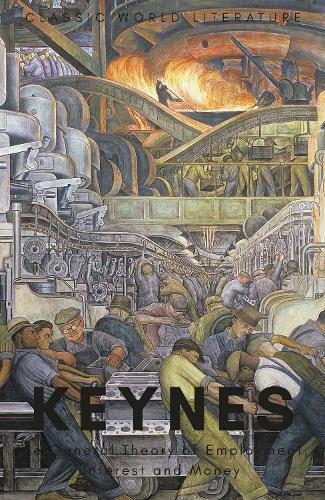Readings Newsletter
Become a Readings Member to make your shopping experience even easier.
Sign in or sign up for free!
You’re not far away from qualifying for FREE standard shipping within Australia
You’ve qualified for FREE standard shipping within Australia
The cart is loading…






John Maynard Keynes (1883-1946) is perhaps the foremost economic thinker of the twentieth century. On economic theory, he ranks with Adam Smith and Karl Marx; and his impact on how economics was practiced, from the Great Depression to the 1970s, was unmatched. ‘The General Theory of Employment, Interest and Money’ was first published in 1936. But its ideas had been forming for decades - as a student at Cambridge, Keynes had written to a friend of his love for ‘Free Trade and free thought’. Keynes’s limpid style, concise prose, and vivid descriptions have helped to keep his ideas alive - as have the novelty and clarity, at times even the ambiguity, of his macroeconomic vision. He was troubled, above all, by high unemployment rates and large disparities in wealth and income. Only by curbing both, he thought, could individualism, ‘the most powerful instrument to better the future’, be safeguarded. The twenty-first century may yet prove him right. In ‘The Economic Consequences of the Peace’ (1919), Keynes elegantly and acutely exposes the folly of imposing austerity on a defeated and struggling nation. AUTHOR: John Maynard Keynes, 1st Baron Keynes CB FBA, was a British economist. His ideas fundamentally changed the theory and practice of macroeconomics and the economic policies of governments.
$9.00 standard shipping within Australia
FREE standard shipping within Australia for orders over $100.00
Express & International shipping calculated at checkout
John Maynard Keynes (1883-1946) is perhaps the foremost economic thinker of the twentieth century. On economic theory, he ranks with Adam Smith and Karl Marx; and his impact on how economics was practiced, from the Great Depression to the 1970s, was unmatched. ‘The General Theory of Employment, Interest and Money’ was first published in 1936. But its ideas had been forming for decades - as a student at Cambridge, Keynes had written to a friend of his love for ‘Free Trade and free thought’. Keynes’s limpid style, concise prose, and vivid descriptions have helped to keep his ideas alive - as have the novelty and clarity, at times even the ambiguity, of his macroeconomic vision. He was troubled, above all, by high unemployment rates and large disparities in wealth and income. Only by curbing both, he thought, could individualism, ‘the most powerful instrument to better the future’, be safeguarded. The twenty-first century may yet prove him right. In ‘The Economic Consequences of the Peace’ (1919), Keynes elegantly and acutely exposes the folly of imposing austerity on a defeated and struggling nation. AUTHOR: John Maynard Keynes, 1st Baron Keynes CB FBA, was a British economist. His ideas fundamentally changed the theory and practice of macroeconomics and the economic policies of governments.